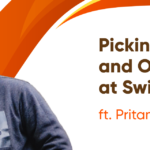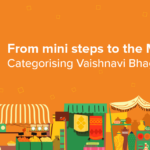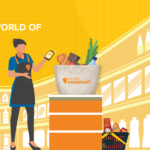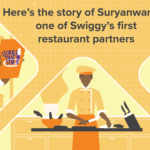Uncover a ‘pot’ full of interesting revelations, stand-out moments, and Swiggy’s pinch of support in making the biryani brand a people’s favourite.
Jumping into the food industry and scaling a successful business isn’t always a smooth journey. In a market like F&B that is more competitive than ever, the path to growth requires clarity of thought, consistency in execution, and the right support. Swiggy’s latest series, Growth Platter covers fascinating stories of restaurants that steadily made their way to the top.
This edition of the series features Lokesh Krishnan, founder of Potful – The Claypot Biryani Experts, in conversation with Deepak Maloo, AVP of Food Strategy, Customer Experience & Restaurant Experience at Swiggy. Apart from discussing the age-old but ever-relevant question of whether vegetable biryani is even a thing, the story also covers the past and present of the brand. Currently operating in Bangalore, Chennai, and Hyderabad, the popular biryani eatery has 26 outlets, and is one of the highest-rated brands on Swiggy. Read about Lokesh’s love for biryani, making a business out of it since 2017, the importance of innovative dishes, and the brand’s continuous growth with support from Swiggy.
How would you describe your brand, Potful?
Potful is a cloud-kitchen-based biryani brand operating for the last six-and-a-half years out of Bangalore. We specialise in a variety of biryanis popular across India. Be it Hyderabadi, Lucknowi, or Kolkata Biryani, we have something for every palate. The biryani is freshly prepared in the authentic ‘Dum’ style, cooked in traditional ‘handis’ or claypots, and delivered to our customers in the same pot. This way, all the flavours are intact, and the biryani is super hot and fresh, making it an authentic biryani experience at your doorstep.
What inspired you to take up the entrepreneurial route?
I come from Bhadravathi, a small town in Karnataka. When I moved to Bangalore to do my B.Tech, it wasn’t easy for my parents to fund my education. In fact, my younger brother began his career much earlier because of just that. So I too wanted to start earning as early as possible. After my graduation, I took up a part-time job, and soon after, I got an offer from Amul. Before joining, I had a break of a few weeks, and wanted to use it well. I started purchasing milk in tankers from Namakkal, Tamil Nadu which I would then supply to a dairy in Mandya, Karnataka. In the process, I found out that Mandya was also famous for its tender coconuts. So, I would buy them on my way back to Bangalore, and then sell them to the vendor next to my house. This entire experience is probably what sowed the first seeds of entrepreneurship for me. Post the break, I joined Amul, marking my first corporate stint at an FMCG.
As a part of Amul and in the stints that followed, how did you scale these businesses?
I was a part of Amul’s Ice Cream Team where I worked with a fantastic bunch of people. While launching the brand in Hyderabad, I treated it as if it was my own business and not just a project I was part of. This attitude made all the difference. Later, I joined METRO Cash & Carry, again as a part of the company’s initial team. There as well, I made sure to steer the business by taking full ownership of everyday operations. Eventually, I went on to become a board member there. So, before I ventured into my own business, I already had the exposure of two corporate stints.
What was your mindset when you decided to be an entrepreneur, and how did your family react?
Back in 2012, I remember telling my wife about all the ideas and plans I had in mind. Even with my friends, I used to keep sharing business ideas during our conversations. One day, my wife told me that my ideas were great, and I had nothing to lose. Even if I failed, I could always go back to corporate life. That’s when I knew I absolutely had to do it. It was September 2016 when I decided to start my own business, and the rest is history.
How did you decide to start a biryani brand given the high competition and demand for the dish?
Initially, we had two large businesses – one was grocery delivery, and the other was biryani. I was aware of the competition, but didn’t fully know the industry as a whole. The decision to start a biryani brand, however, was because it’s a dish very close to my heart. When I was with Amul in Hyderabad, every single day was a biryani day for me. I relished biryani from my favourite brand at the time without ever getting tired of it. It was purely my love for the dish that led to the Potful journey.
Vegetarians are often told that there’s no such thing as ‘Veg Biryani’. What’s your take on that?
The debate is never-ending. While I respect the views of non-vegetarians on Veg Biryani, I also want to share that 30 percent of our biryani variants are consumed by vegetarians. We offer several veg choices because there is genuinely a lack of good vegetarian options available in the market. Potful has variants like Jackfruit, Paneer Tikka, Mushroom, and Mixed Vegetable biryanis. So many biryani brands still think that vegetarian biryani isn’t a thing, which is why they don’t focus on this category. But, we look at it differently. I also disagree with those who say that it’s merely a form of Pulao, and would encourage vegetarians to try out our Veg Biryani.
What has been your mantra behind launching and scaling Potful?
We have paid attention to two things in particular. One includes the quality of the items we source, the ingredients we store, and the way we deliver them from our central kitchen to sub-kitchens. The other primary aspect is quite simple execution, execution, and execution! For instance, you may have been a happy customer of Potful for over a year, and yet, one bad experience from our end can make you think twice before choosing us again. For Potful, the mantra lies in consistent execution and an obsession with providing a great customer experience.
With the various types of biryani across Indian states, how do you narrow down the menu options?
India is a country that loves biryani. Even on Swiggy, it has been one of the most ordered dishes for several years. So, for us it’s all about customising our offerings based on the location. When you are in Bangalore, for example, you might have a Hyderabadi Biryani offering in the city. However, the same kind of Hyderabadi Biryani with that level of spice might not be suitable for another region. To customise our offerings effectively, we spend a lot of time understanding the product before even introducing it to the market.
What would your advice be for people who want to start a restaurant business?
Firstly, they must analyse whether their offering is unique, and only then go ahead with it. Next, I believe they must commit to it full-time so they are prepared for all the ups and downs along the way.
Also, running a business may require them to work long hours and this could impact their social lives, which was the case with me while setting up Potful. Thankfully, my friends and family stood by me throughout, not to mention, the initial seven-member team that is with Potful even today. So, to sum up, anyone who’s looking to start a restaurant business should find their strong support system. And of course, they must treat their team right and ensure everyone’s success. I truly believe that more than money, it’s about how respected your people feel at work.
What role has Swiggy played in Potful’s growth?
So, this takes me back to when I lived in Malleshwaram, Bangalore. There was a popular South Indian food spot I liked that always had a long queue of people waiting outside. I found out about Swiggy in 2015, and was blown away by the fact that I could now order in my favourite dosa without waiting in line. I have been fascinated ever since. Today, with Potful being a 100 percent online delivery-based setup, Swiggy has been a natural choice as our partner, and has helped us expand our geographical reach. For instance, when we opened our first kitchen in Domlur, Bangalore, being on the platform helped us get orders all the way from Bannerghatta Road. The partnership has also helped us improve our standards because of Swiggy’s innovative ecosystem in the competitive landscape.
Another offering we benefit a lot from is data analytics. We use the customer funnel data extensively to make more well-informed business decisions. If we launch a new product today, the customer feedback on it would help us determine if the product is useful and impactful or not. The data also allows us to figure out areas where we can expand our business, and more importantly, areas where we shouldn’t. All in all, I’d say that Swiggy keeps surprising me, right from day one!








































































